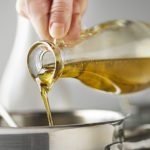According to the Centers for Disease Control and Prevention, just about one in every six adults in the United States has high cholesterol. According to many (but not all) in the medical community, this can double your risk of heart disease.
Now, there is an experimental cholesterol medication, different from the current drugs used to battle cholesterol, that is being touted as a major advancement in lowering the bad, or LDL cholesterol levels.1 The initial research took place at the Metabolic and Atherosclerosis Research Center in Cincinnati, Ohio, and it found that this drug, called REGN727, was tremendously successful in producing lower LDL cholesterol levels.
There were three phases of the trial conducted. The first two phases employed 72 volunteers and focused on determining short-term safety of the medication. REGN727 is a protein created in the laboratory that works to block the bodily protein known as PCSK9 from binding to LDL receptors within the liver. When the protein does bind, it prevents the liver from effectively filtering LDL cholesterol out of the blood. The first two phases of the study found that REGN727 can successfully impede PCSK9 without causing any “immediate” adverse effects.
The third phase of the study used a smaller pool of only 51 subjects. Of these, 21 had a family history of high cholesterol and the remaining 30 had high cholesterol with no family history of the condition. Every one of them had been taking Lipitor, a commonly prescribed cholesterol medication in the statin family used to reduce cholesterol levels. The second group of participants with high cholesterol levels but no family history was used as a control population, provided with a modified diet but no medication. The result was a 60 to 65 percent decrease in LDL cholesterol for those who were given REGN727.
If, in fact, these findings can be duplicated in larger studies that also address their long-term safety, this could be very good news for the many people with cholesterol problems who are currently prescribed statins. Statins have been linked with many serious side effects. They have been found to cause structural damage to the muscles, and this damage can continue to progress even after patients stop taking the drugs.2 Other reported effects include severe memory loss, nerve damage, trouble talking, nausea, vertigo, and a fifty percent increased risk of cancer. And while the drugs do lower cholesterol, research shows that they do absolutely nothing to lower your chances of suffering a cardiac event. A large-scale study published in 2008 found that Lipitor prevents only one heart attack per 100 users.3 Based on this study, and others like it, many physicians now question the wisdom of prescribing statins unless you’ve already had a heart attack.
Unfortunately, REGN727 may ultimately turn out to be no better. First of all, the study that just took place was funded by Regeneron Pharmaceuticals and Sanofi, the manufacturers of the drug. Needless to say, it might be in the best interest of their bottom line to make sure the information that gets published shows the medication in a positive light. Eventually, harmful side effects may begin to appear, or long-term damage might result. And, as with statins, just because a pharmaceutical works to lower cholesterol levels does not necessarily mean it will protect us from cardiovascular disease. In fact, as Jon Barron has frequently pointed out, cholesterol may actually turn out to be more of a canary in a coal mine, rather than an actual health risk in and of itself. Yet not only are these drug companies pushing full steam ahead, but at least four other major manufacturers are heavily invested in research and development for PCSK9-inhibiting meds of their own.
All that said, it’s the other factor buried within the clinical trial that is truly the key to safely lowering not only cholesterol levels but the risk of cardiovascular disease as well: dietary changes. Reducing your consumption of high omega-6, polyunsaturated fat vegetable oils, for example, will reduce the circulating NEFA concentration in your blood, which will do far more to prevent arterial damage and heart attacks than any cholesterol lowering medication. Add to that daily exercise, and your doctor will have no reason to promote your taking REGN727, statins, or any other class of cholesterol-lowering drugs again.
1 Curley, Ann J. “Experimental Cholesterol Drug Results Called ‘Game Changing’.” Ozarks First. 22 March 2012. Accessed 8 April 2012. <http://ozarksfirst.com/fulltext?nxd_id=621112>.
2 Thomas, Jennifer. “Statins May Cause Muscle Damage in Some Patients.” US News. 6 July 2009. Accessed 8 April 2012. <http://health.usnews.com/health-news/diet-fitness/heart/articles/2009/07/06/statins-may-cause-muscle-damage-in-some-patients>.
3 Carey, John. “Do Cholesterol Drugs Do Any Good?.” Businessweek. 17 January 2008. Accessed 10 April 2012. <http://www.businessweek.com/magazine/content/08_04/b4068052092994.htm>.












There is no scientific proof
There is no scientific proof that lowering LDL cholesterol actually saves lives. In fact there is no proof that Cholesterol actually causes death. This is simply another money making scheme by the big pharmaceutical companies because the patents on statins are running out, and this corrupt theory of cholesterol being the baddie has been such a huge money spinner for the drug barons, they will not go out quietly. They will continue to milk it for all they can, even while needlessly attempting to frighten people into taking their dangerous drugs. Wake up people and smell the roses while you still can……… read what other people have suffered by attempting to lower an alcohol (not a fat) that the body desparately needs for just about every cellular and hormonal function you can think of.
Yes I fully agree with this
Yes I fully agree with this above statement. Can some one tell me that suppose if the LDL cause the CHD then WHY WHY the medical expert are shouting for ANTIOXIDANTS????. PLEASE PLEASE tell the world WHY we need ANTIOXIDANTS??. Thanx
Medical experts are calling
Medical experts are calling for anti-oxidents? Pharmaceutically trained medical experts? I’ve not encountered any. Please enlighten me.
I agree with you. Why not try
I agree with you. Why not try to experiment some natural ways to lower cholesterol. In this article you will find great tips that will help lower cholesterol –articles.mercola dot com. If everything listed in that article works well, it will be good for many people using cholesterol drugs and they will not feel the side effects they always complain.
I FULLY AGREE WITH THIS
I FULLY AGREE WITH THIS ARTICLE. ONE THING I WD LIKE TO ASK THE MEDICAL EXPERT THAT IF AS THEY SAY THAT LDL CAUSING CHD THEN WHY ALL THE MEDICAL SCIENTISTS ARE STRESSING FOR ANTIOXIDANTS????. IF ANY ONE HAS THE ANSWER TO THIS MY QUERY PLEASE LET THE WORLD KNOW IT.
If you haven’t already read
If you haven’t already read it, you might find the following article interesting. http://www.jonbarron.org/heart-health/problems-natural-alternative-cholesterol-levels Jon suggests, "A good antioxidant formula that contains OPCs, can help repair damage to arterial walls."
Great information, being very
Great information, being very useful but i think natural ways of treating cholesterol will be beneficial, would love finding out for it.
Just do a search on our site,
Just do a search on our site, we have a ton of information!